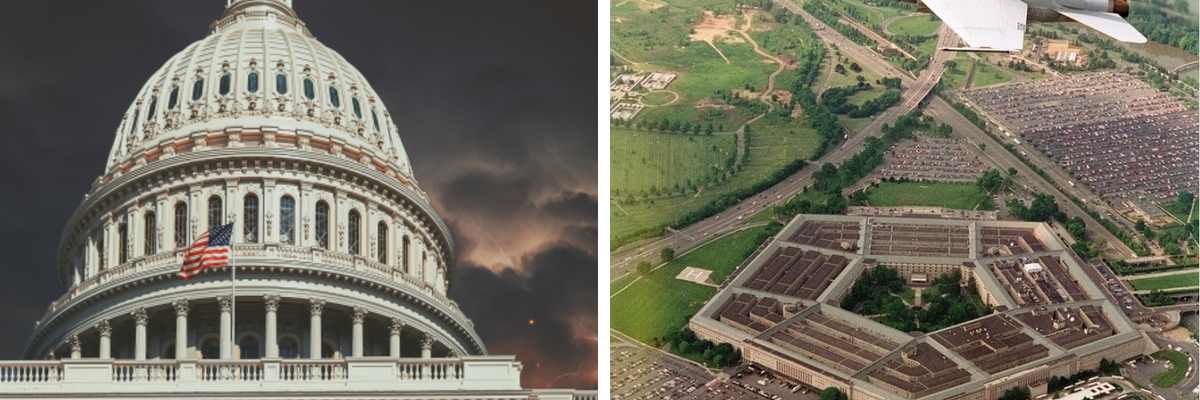Admiral Gene R. La Rocque was sent to Vietnam in 1967 to interview top commanders, field officers, and soldiers and reported back that the war was unwinnable, ruining, some said, a very promising career. Four years later he retired early, inspired by President Eisenhower’s Farewell Address “to guard against the acquisition of unwarranted influence, whether sought or unsought, by the military industrial complex.”
The Center for Defense Information (CDI) was born in April 1972 with the assistance of Navy veteran and businessman Arthur D. Berliss, Jr., (1914-2010), and other entrepreneurs like Harold Willens (1914-2003), and financial backing from the Fund for Peace, thanks to Lindsay Mattison.
CDI then set up its first Capitol Hill office, staffed by former Congressional aide David T. Johnson.
The center quickly gelled as a group of retired military officers, sharp academics, and former Congressional staffers balancing what the Pentagon said about ongoing wars, foreign and military policies, defense budgeting, and nuclear warfighting. The global news media, academia, and politicians began seeking out the center’s expertise and data.
Through the 1970’s, CDI's experts spoke out against the Vietnam War, weapons like the B-1 bomber, the MX missile, and tactical nuclear missiles deployed to Western Europe, and many other matters addressed in its Defense Monitor newsletter.
By the mid-1980s, CDI’s associate directors included the former commander of the carrier Midway, Rear Admiral Eugene J. Carroll, Jr., submariner Captain James Bush, Major General William T. Fairborn of the Marines, and Army Chaplain Major General Kermit D. Johnson — predominantly combat veterans who opted out of more lucrative defense industry jobs to tell it the way that it really was.
Despite the Pentagon’s animosity to CDI, it began to have a real impact inspiring other reformers and whistleblowers of waste, fraud and abuse to write and advocate for change like Chuck Spinney, Pierre Sprey, and Winslow Wheeler.
CDI grew in size and stature as many like-minded Congressional offices and think-tanks solicited its advice on opposing the nuclear arms race and speaking out against covert and overt wars in Iran, Grenada, Nicaragua, Panama, and Iraq. Meanwhile, the Center made global headlines in 1987, hosting the first high level meeting of retired American and Soviet admirals and generals, "to publicly discuss their nations’ military force deployments and examine ways to reduce the risk of war.”
With the help of longtime peace advocate Sanford Gottlieb, a former director of SANE, filmmaker Arthur Kanegis, and later director of television Mark Sugg, the organization in 1987 established a weekly documentary series, “America’s Defense Monitor,” which aired on public TV stations in the U.S. and Canada, as well as the Armed Forces Network.
Over the next 15 years the program won accolades and awards as it covered all bases, touching on virtually every issue the Center focused on, from opposing international arms sales to expanding women’s roles in the military. With high quality footage for the time, episodes featured interviews of prominent experts and critics, supporters and opponents of reform.
In the post-Cold War 1990s, CDI kept up its visits to the embargoed island of Cuba, arguing that America should treat it as it dealt with other communist nations like Vietnam and China, while quietly pushing for more democratization. Before his 1993 retirement, La Rocque and staff criticized unnecessary overly expensive weapons like the Star Wars missile defense system, the F-22 fighter, and the B-2 bomber.
Admiral Carroll took over as director, traveling far and wide to oppose destabilizing nuclear strategy and weaponry. The center called out the Navy for using Vieques Island as a bombing range, and for harming dolphins and whales inadvertently. It also supported Okinawans and others who wanted to scale back America’s vast network of overseas bases, to clean up the toxic legacy of America’s nuclear bomb-making, and opposed NATO expansion.
In 1997, Vice Admiral Jack Shanahan, who also served several years as director, warned the Senate Foreign Relations Committee of “The Clinton Administration’s headlong rush to NATO expansion,” noting that, “We could well be on brink of reviving superpower confrontation …if we continue plans to bring Eastern European countries into NATO while excluding Russia.” A warning unheeded, and which has resulted in the current global crisis caused by Putin’s invasion of Ukraine.
In the new millennium, with former nuclear missile launch control officer Dr. Bruce Blair at the helm, the center responded to 9-11 with massive growth and CDI offices opened in Brussels and Moscow, more documentary platforms allied with CNN and PBS through Azimuth Media, and the creation of international networks to discuss and debate issues in China and by Farsi-speaking peoples in southwest Asia.
CDI unfortunately dissolved in 2012, but was absorbed and kept alive by the Project on Government Oversight (POGO), where it remains today. In the last decade, POGO’s work by Winslow Wheeler, Mandy Smithberger and Dan Grazier has revealed a myriad of problems involving the development of the unreasonably expensive F-35 Joint Strike Fighter, among other bloated and ineffective weapons systems.
But there is always more work to be done, as stated in a 2009 Defense Monitor by Wheeler: …the Pentagon’s comprehension of its own material resources is a deep dark void. It can’t track its own money, it cooks its own books to make them appear in balance, and then it makes new spending decisions based on the phony data…There are three decades of GAO and DOD Inspector General reports on this mess.
The spirit of CDI prevails, demanding that not only American policymakers but global leaders continue to make essential changes and reforms that Admiral La Rocque and the organization strived for during the last half century.















